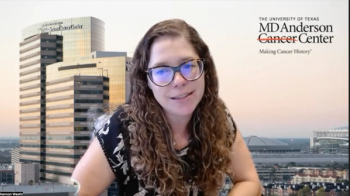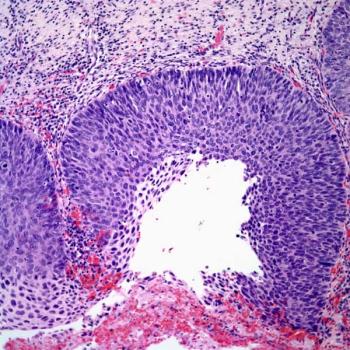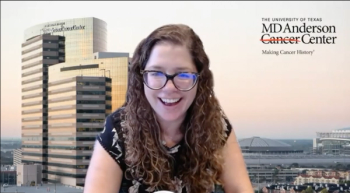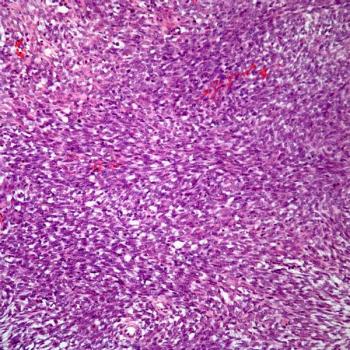
Exercise and healthy lifestyles can lower the risk of cancer or the symptoms of cancer treatment despite having genetic dispositions, said Neil M. Iyengar, MD.

Your AI-Trained Oncology Knowledge Connection!


Exercise and healthy lifestyles can lower the risk of cancer or the symptoms of cancer treatment despite having genetic dispositions, said Neil M. Iyengar, MD.

Researchers advise cancer providers to use online tools, visual aids, and interactive multimedia resources to educate patients before tumor testing.

A recent study published in Nucleus discussed the utility of T-cell replete cord blood transplant in patients with high-risk pediatric acute myeloid leukemia and myelodysplastic syndrome.

A recent study published in Nucleus highlighted the impact of graft-vs-host disease prophylaxis on cytomegalovirus reactivation.

Cell therapy and vaccine approaches are among the several potential options for targeting KRAS in patients with KRAS G12C–mutated non–small cell lung cancer, says Sandip P. Patel, MD.

Investigators report a trend in overall survival improvement among patients with advanced/recurrent endometrial cancer treated with atezolizumab and chemotherapy.

In a recent Training Academy, experts discussed how to incorporate bispecific antibodies into patients with multiple myeloma.

Companion diagnostic designation for FoundationOne CDx may improve access to treatment with capivasertib plus fulvestrant among patients with hormone receptor–positive, HER2-negative breast cancer harboring select alterations.

Findings from the phase 3 SKYSCRAPER-02 trial support outcomes following atezolizumab plus chemotherapy for patients with extensive-stage small cell lung cancer.

Future analyses will look at durvalumab/olaparib for endometrial cancer populations with TP53 and POLE alterations, as well as those with estrogen receptor and progesterone receptor positivity.

Data from the phase 2 DESTINY-PanTumor02 trial support trastuzumab deruxtecan as a potential treatment for patients with gynecologic HER2-expressing tumors that have progressed on prior therapy.

Data from the phase 3 MARIPOSA-2 study support the supplemental biologics license application for amivantamab plus chemotherapy in EGFR-mutated advanced or metastatic non–small cell lung cancer.

New treatment updates could help find more patient subtypes to target and treat in the world of CRC, according to Kristen K. Ciombor, MD, MSCI.

Additional research is needed to confirm whether capivasertib/fulvestrant offers increased benefit in patients with locally advanced or metastatic breast cancer not harboring AKT pathway alterations.

A study conducted by the American Cancer Society found patients who were Black received worse care for colorectal cancer treatment, with health insurance is the leading cause of racial disparities.

Findings from the phase 2 SKYSCRAPER-04 trial support dual targeting of TIGIT and PD-L1 in patients with PD-L1–positive cervical cancer, says Ritu Salani, MD.

Data from the phase 3 EV-301 study turn up no new safety signals in patients with advanced urothelial carcinoma treated with enfortumab vedotin.

Patients with mismatch repair proficient, newly diagnosed, advanced or recurrent endometrial cancer may have enhanced benefit with the addition of olaparib to durvalumab.

Data from the phase 3 MIRASOL trial support mirvetuximab soravtansine as a new standard of care for patients with folate receptor α–positive, platinum-resistant ovarian cancer, says Kathleen N. Moore, MD, MS.

Results from the phase 3 GCIG INTERLACE trial highlight progression-free survival and overall survival improvements with induction chemotherapy plus chemoradiotherapy for patients with locally advanced cervical cancer.

Paolo Tarantino, MD, gives an overview on how the recently approved combination of capivasertib plus fulvestrant can help improve treatment strategies for patients with locally advanced or metastatic breast cancer that is hormone receptor–positive, HER2-negative breast cancer

Patients with locally advanced or metastatic breast cancer that is hormone receptor–positive, HER2-negative breast cancer with 1 or more PIK3CA, AKT1, or PTEN alterations may now receive capivasertib plus fulvestrant.

First-line pembrolizumab plus chemotherapy has been approved by the FDA for patients with HER2-negative gastric or gastroesophageal junction adenocarcinoma.

Experts in the multiple myeloma space met to discuss the treatment and monitoring after bispecific antibodies.

The progression-free survival benefit of dostarlimab and chemotherapy extends to those with mismatch repair deficient or microsatellite instability–high advanced endometrial cancer.

In the October edition of Snap Recap, we review the latest FDA news and the vote from the last ODAC meeting.

Radical hysterectomies result in worse symptom experience, body image, menopausal symptoms, sexual worry, sex activity and enjoyment compared with simple hysterectomy in those with early-stage cervical cancer.

Data from the phase 1/2 TRIDENT-1 trial support the FDA approval of repotrectinib for those with ROS1-positive advanced or metastatic non–small cell lung cancer.

Progression-free survival benefit appears consistent in patients with recurrent or metastatic cervical cancer treated with tisotumab vedotin.

Combining atezolizumab with bevacizumab and chemotherapy may be a new frontline therapy option for patients with metastatic, persistent or recurrent cervical cancer, says Ana Oaknin, MD, PhD.